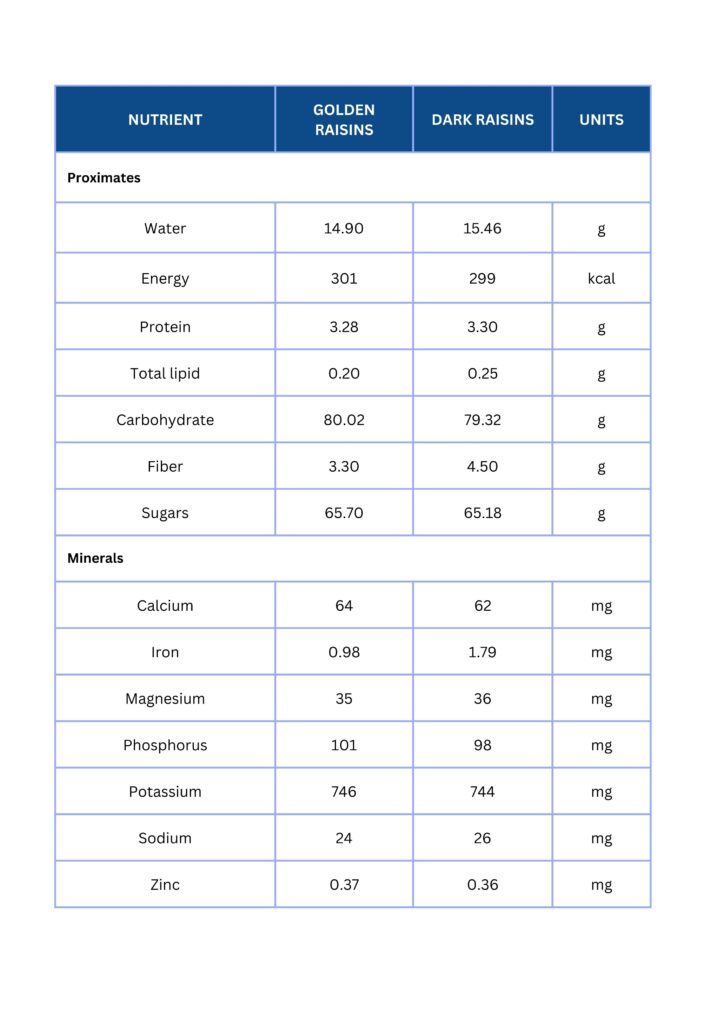Raisins are dried grapes consumed worldwide that contain beneficial components for human health. Raisins are a good source of essential nutrients, minerals, and energy in the form of calories and sugars.
The type of raisin depends on the grape variety, colour and size. The most common are dark raisins, usually obtained from Thompson seedless grapes. Golden raisins, or Muscats, are normally produced from white Muscat grapes. Sultanas originate from seedless yellow grapes and are usually sweeter and softer than other varieties. Zante currants, currants or Corinthian raisins are produced from black Corinth grapes and are smaller in size.
Raisins can be a helpful and beneficial addition to the diet, some of the health benefits are:
Aid in digestion
Raisins may be a simple way to help keep the digestive system healthy. Raisins contain helpful soluble fibres, which give body to the stool and help it pass through the intestines easier. This may help improve digestion and promote regularity.
Prevent Anemia
Raisins may play a part in preventing anemia. They contain good amounts of iron, copper, and vitamins that are essential for making red blood cells and carrying oxygen throughout the body.
Prevent too much acidity
Raisins contain substantial amounts of beneficial minerals, such as iron, copper, magnesium, and potassium. These are alkaline, or basic, minerals on the pH scale and may help balance acidity levels in the stomach.
Lower risk of heart disease risk factors
A study posted to Postgraduate Medicine Trusted Source noted that regularly eating raisins may help reduce cardiovascular risk factors, such as blood pressure rate when compared to other snacks. This is because raisins are a low-sodium food that also contains a good source of potassium, which helps the blood vessels relax.
Fight against cancer cells
Raisins are also a good source of antioxidant compounds.
Dietary antioxidants are essential, as they may protect the body from oxidative damage and free radicals. Oxidative damage and free radicals are risk factors in many types of cancer, tumour growth, and aging.
Protect eye health
Raisins contain polyphenols, which are antioxidants that may protect the cells in the eyes from free radical damage. This may in turn help protect the eyes from eye disorders, such as age-related macular degeneration and cataracts.
Improve skin health
Antioxidants may help keep the skin cells young and prevent damage from aging cells. Raisins also contain valuable nutrients, such as vitamin C, selenium, and zinc. This combination of nutrients and antioxidants may be a helpful addition to a diet that focuses on creating good skin health.
Lower blood sugar
The Postgraduate Medicine Trusted Source study also noted that compared to eating other snacks, regularly eating raisins may help lower a person’s blood sugar. Even though raisins contain a more concentrated amount of sugar than fresh fruit, raisin intake compared to processed snacks decreased hemoglobin a1c, which is a marker of blood sugar management.
This means that a serving of raisins may be an excellent way to satisfy a sweet craving.
Table. Nutritional Composition of Golden and dark seedless raisins (100g)

References
- Butler Natalie. Medical News Today. What to know bout raisins, 2019.
- Olmo-Cunillera Alexandra. Escobar-Avello Danilo. Perez Andy J. Marhuenda-Munoz Maria. Lamuela-Raventos Rosa Maria. Vallverdu-Queralt Anna. Is Eating Raisins Healthy?. National library of medicine, 2019.